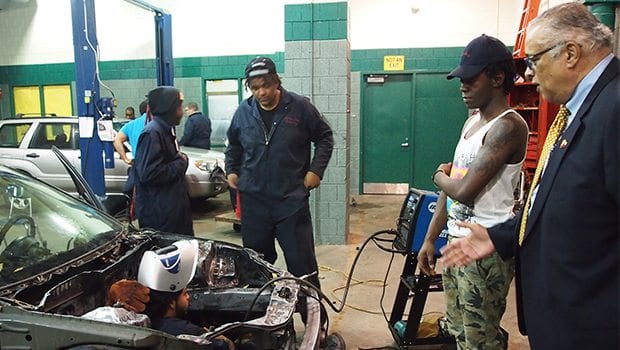

Madison Park seniors Paige Sullivan, of the South End, Crismelis Nunez of Jamaica Plain and Giovanna Mannering of Dorchester put the finishing touches on a batch of truffles that will be sold at lunch time at Madison Park. Proceeds from work the students engage in helps with the upkeep of the equipment they train on.
In the Automotive Technology department, instructor Tom Rafferty wheels in two small diesel engines, part of a growing collection for the Madison Park Technical Vocational students to work on. Some will be converted to bio diesel. The students, most of whom are engrossed in the empty engine compartment of a Honda, barely notice.
In Carpentry, the students are reviewing fractions before they head to the North Avenue construction site where they have already poured a foundation with insulated concrete forms and built a two-story frame of a new affordable home, working with YouthBuild and the New England Regional Council of Carpenters. Next up, they’ll be installing the roof.
In the bakery, Culinary Arts students Paige Sullivan, Crismelis Nunez and Giovanna Mannering put the finishing touches on a batch of truffles they will sell at lunch time.
The bustle of activity at Madison last week contrasts sharply with the rocky start of the school year, when students protested outside the school after many went more than a week without a class schedule. That headline-generating debacle was emblematic of the challenges the school has faced in recent years as it has struggled with administrative turnover and what many describe as a lack of resources.
The latest casualty of the school’s struggle, Diane Ross Gary, was forced to resign in the wake of the students protests. The current headmaster, Al Holland, said the challenges Gary faced were considerable.
“She did a lot of things no headmaster has had to do,” he told the Banner. “She had to hire an administrative team and 60 teachers in the week before the opening of school. People don’t know how difficult that is.”
Holland, a consultant to the Boston Public Schools who retired from Health Careers Academy in 2008, where he served as headmaster, says Madison Park now has the support of interim School Superintendent John McDonough.
“The superintendent has made a commitment to make Madison a successful school,” Holland said. “Anytime it starts from the top, it’s going to happen.”
Staffing issues aside, Madison has faced other considerable challenges.
In recent years, the number of students in Special Education at Madison has risen to a third of the population, far in excess of the statewide average of 17 percent. And a third of the students at Madison are English language learners as well. The school now has an English Language Learners director and a Special Education director, in addition to new program directors, a director of Student Support and a chief academic officer.
Next, Holland says the school needs a roadmap for reform.
“We need to have a comprehensive plan that focusses on how we move it forward and make it the best technical school in this state,” he said.
Holland says he and Madison Park faculty and administrators are meeting with parents and community members to help develop the plan.
Holland says the school will need additional resources for its technical and academic programs.
“The school is stabilized and operating as a normal career technical high school,” he said. “But there’s a lot of work to be done. Over the years this school has been treated like a regular high school. And it’s not.”
Holland, who served as an executive assistant under former superintendents Lois Harrison Jones and Thomas Payzant, said the school department has to change its policy of allocating resources equally to all high schools, given Madison Park’s unique status as a trade school.
“Superintendent McDonough has started the process of looking at Madison Park as a career technical high school, which other superintendents have not,” he said. “Every superintendent has been challenged by the budget process, making sure that every school has equal resources. If your student population of English language learners and Special Education students is higher, you have to factor that into you funding.”
One area where Madison Park has excelled is in the partnerships it has built in recent years, many of which are coming to fruition now: YouthBuild and the carpenters union working with the carpentry students; the hotel workers union Unite Here, which is working with students in food services; students in the automotive repair and auto body repair programs work with local garages on their repair projects.
“If we can build a house and provide a living space for people from the community, it’s a great learning experience and the kids are contributing to the community,” Holland said.







